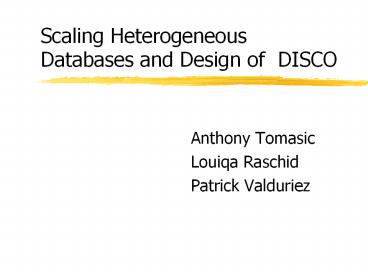Scaling Heterogeneous Databases and Design of DISCO - PowerPoint PPT Presentation
Title:
Scaling Heterogeneous Databases and Design of DISCO
Description:
Scaling Heterogeneous Databases and Design of DISCO Anthony Tomasic Louiqa Raschid Patrick Valduriez – PowerPoint PPT presentation
Number of Views:73
Avg rating:3.0/5.0
Title: Scaling Heterogeneous Databases and Design of DISCO
1
Scaling Heterogeneous Databases and Design of
DISCO
- Anthony Tomasic
- Louiqa Raschid
- Patrick Valduriez
2
DISCO Architecture
A Application M Mediator C Catalog W
Wrapper D Data Source
3
Problems with the Architecture
- Fragile mediator Problem - Mediator schema may
have to be changed when a new source is added. - Source capability problem - Different wrappers
may have different functionality. - Graceless failure - The query can not be
processed in presence of unavailable data sources.
4
Overview
- Mediator Query Processing
- Describing Source Capabilities
- Mediator Cost Model
- Partial Evaluation of Queries
5
Mediator Query Processing
6
Incorporating Source Capabilities
- Describing the operators Wrapper exports
information about which operators it can execute
and on which collections. - Select publications 1 bind Author ()
- bind
KeywordTitle () - project publications 2 bind combine Author ()
- bind combine Title ()
- scan ALL
- Mediators can also accept context-free grammar
which describes the functionality of the wrapper.
7
Mediator Cost Model
- The Mediator has a generic cost model
- Unary Operators
- sequential scan and index scan
- cost formulae derived using calibrating approach
- Binary Operators
- index join, nested loops and sort-merge join
- if index is available, index join is chosen,
otherwise the best of the other two - Wrapper can override the mediator model by
exporting statistics and/or cost formulae.
8
Cost Communication
- Exporting Statistics - Wrapper can export
statistics through two special methods attribute
and extent attached to each interface
description. - Exporting Formulae - Wrapper specific cost
formulae can be described using rules. - For example,
- select(C, A V ) lt
CountObject C.CountObject selectivity(A, V)
TotalSize CountObject
C.ObjectSize TotalTime C.TotalTime
C.TotalSize 25 - Mediator selects the most specific rule.
9
Partial Evaluation of Queries
- If a data source is unavailable, DISCO evaluates
as much of the query as possible and returns
another query. - Example
- Consider the following query run when person2 is
unavailable - select x.name
- from x in person0, y in person1, z in
person2 - where x.name y.name and y.name z.name
- Returns the following result (where t0 is person0
join person1) - select w.name
- from w in t0, z in person2
- where w.name z.name
10
Extracting Information
- Opaque Partial Answers No extraction possible.
- Transparent Partial Answers Can ask a
parachute query which is related to the
original query. - For example, a parachute query for the earlier
example can be - select x.name
- from x in person0, y in person1
- where x.name y.name
- Parachute query is evaluated by rewriting it over
the materialized relations.
11
Constrained Evaluation of Queries
- The optimizer tries to ensure that the parachute
queries can always be evaluated (if possible at
all) in case of failures. - For example, if the parachute query is (A join
C), then - it will not be possible to evaluate it if B
fails.
12
Partial Evaluation of Queries
- Open Issues
- Semantics with updates to data sources
- Tradeoffs between materializing partial answers
and resubmitting the original queries - Aggregate queries ?
- APPROXIMATE ?
13
The Good
- It can handle wrappers with different
capabilities. - Mediator uses a generic cost model which can be
overridden by the wrapper. - Partial evaluation of queries and extraction of
information from partial answer.
14
The Bad
- Queries involving different wrappers have to be
done at the mediator. - Only implemented a relational subset of the
model. - Data replication not addressed.
15
The Ugly
- Arbitrary source capabilities can not be easily
handled. - Proliferation of wrapper specific cost rules can
make query optimization very expensive. - Centralized query optimization - wrappers dont
have much control over it. - Autonomous data sources ?
16
Mediator Query Processing
- Reformulate the query into local schemas.
- Transform the query into logical operator trees.
- Decompose each query into wrapper sub-queries and
a composition query. - Modify the wrapper sub-queries and the
composition query to reflect the capabilities of
the wrappers. - Generate distributed execution plans .
- Select the minimum cost plan.
- Send the wrapper sub-trees to the wrappers and
execute the composition query on the results.
17
Mediator Data Model
- Extensions to ODMG 2.0
- multiple extents per interface using MetaExtents
- interface MetaExtent
- attribute String name
- attribute Extent e
- attribute Type interface
- attribute Wrapper wrapper
- attribute Map map
- type mapping
18
Accessing Data Sources
- Define a wrapper object.
- wrapper w0 rmi//rodin.inria.fr/PersonWrapper
- Define a wrapper schema.
- extent p0 of Person
- interface Person
- attribute String name
- attribute Short salary
- This is exported to the mediator.
- Define the mediator schema.
19
Accessing Data Sources
- Define the mediator extents
- extent person0 of Person wrapper w0 extent p0
- extent person1 of Person wrapper w1 extent s1
- map (name sname)
- Can use subtyping and views to define more
complex transformations on the data sources. - define double as
- select struct (name x.name, salary
x.salaryy.salary) - from x in person0 and y in person1
- where x.name y.name
20
Mediator Query Processing































